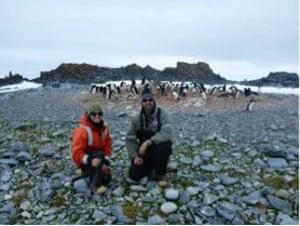New research shows penguins will suffer in a warming world
Posted on 4 August 2016 by dana1981
We know the world is warming, and we know humans are the main reason. But so what? The thing we’d really like to know is, what will the impacts be on our planet, its biodiversity, our society, our economies? It is only through understanding the impacts of climate change that action for reducing greenhouse gases can be motivated.
This is one of the reasons I was so interested in a very recent study from the University of Delaware, which addressed how penguins will fare in a warming world. The article was published in Scientific Reports and is available open access so anyone with an internet connection can read it here.
Lead author Megan Cimino and her colleagues looked at Adelie penguin populations and asked whether their years of increasing or decreasing population corresponded to warm, cold, or normal temperatures. In the Antarctic, which is where these penguins live, the situation is a bit complex because the land area is large and weather/climate changes are not consistent across the region.
For instance, large parts of the Western Antarctic Peninsula (WAP) are warming quite rapidly, amongst the most rapid in the world. On the other hand, in the East, some areas are warming just a little while others are cooling slightly. Since Adelie penguins live on the periphery of the ice sheet, they are exposed to a wide range of Antarctic climate regions.
The authors found that penguin colony declines occur preferentially in years where the sea waters are warmer than average. This is in contrast to colonies whose populations are stable or increasing – those occur in normal or cooler waters. This finding was particularly striking when Adelie penguin populations in the WAP (which is warming) were compared with populations elsewhere in the continent.
This knowledge of past penguin colony health was obtained by actual measurements, primarily satellite data which provided sea surface temperatures and ice extent. But the important extension of this work is into the future. The scientists took their current knowledge of penguin health and climate and asked what will happen to these penguins in the future.

Megan Cimino and Matthew Oliver. Photograph: University of Delaware/Megan Cimino
Since we do not have measurements in the future, the scientists used climate models. These models are computer calculations of the actual climate that will exist in the future, and the calculations are based on our best understanding of how the climate system works. Fortunately, climate models have an excellent history in predicting how the future will evolve. While climate models are never perfectly accurate, they give enough information so that researchers like Megan and Matthew can make educated predictions.
The predictions that emerged from the study are that approximately 20% of the penguin populations may be in decline by 2060. As the planet and oceans continue to warm, the pressure on penguins will increase. However, the researchers also report that the penguins will not completely die out. There will remain refugee communities of penguins that exist beyond 2100. We can be grateful for this silver lining.































 Arguments
Arguments






























"But the important extension of this work is into the future." Making predictions is difficult especially about the future. At best, this work is a What-if analysis.